- Home
- Heather Morris
Cilka's Journey (ARC) Page 2
Cilka's Journey (ARC) Read online
Page 2
So, she had allowed herself just one moment of hope,
sitting in that block back in that place, waiting. She shouldn’t have dared. She is destined to be punished.
Maybe it is what she deserves. But, as the train gathers
speed, she vows she will never, ever end up in a place like
Block 25 again.
There must be more ways to stay alive than to be witness
to so much death.
Will she ever know if her friends who were forced to
march out of the camp made it to safety? They had to.
She can’t bear to think otherwise.
As the rhythm of the train rocks the children and babies
to sleep, the silence is broken by the howl of a young
mother holding an emaciated baby in her arms. The child
has died.
Cilka wonders what the other women have done to end
up here. Are they Jewish as well? The women in the prison
mostly had not been, as she gleaned from overhearing
various conversations. She wonders where they are going.
By some miracle, she dozes.
A sudden braking of the train throws its passengers
around. Heads bang, limbs are twisted, and their owners
10
481YY_tx.indd 10
25/07/2019 06:31
cry out in pain. Cilka braces herself by holding on to the woman who has spent the night leaning into her.
‘We’re here,’ someone says. But where is here?
Cilka hears train doors clanging open up ahead, but no
one leaves their compartments. Their carriage door is flung
open. Once again, brilliant sunshine stings Cilka’s eyes.
Two men stand outside. One hands a bucket of water
to grabbing hands. The second soldier tosses in several
hunks of bread before slamming the door closed. Semi-
darkness once again envelops them. A fight breaks out as
the women scramble for a piece of the bread. A too-familiar
scene for Cilka. The screaming intensifies until, finally, an older woman stands up, raising her hands, saying nothing,
and even in the semi-darkness the stance takes up the
space, and is powerful. Everyone shuts up.
‘We share,’ she says, with a voice of authority. ‘How
many loaves do we have?’ Five hands are raised, indicating
the number of loaves of bread they have to share.
‘Give to the children first, and the rest we will share.
If anyone doesn’t get any, they will be the first to eat next time. Agreed?’ The women with the bread begin breaking
off small quantities, handing them to the mothers. Cilka
misses out. She feels upset. She does not know if it’s the
best idea to give the food to the children if where they
are going is like where she has been. It will only be wasted.
She knows it is a terrible thought.
For several hours the train sits idle. The women and
infants fall again into silence.
The silence is broken by the screams of a girl. As those
11
481YY_tx.indd 11
25/07/2019 06:31
around her attempt to quieten the girl, to find out what is wrong, she sobs, holding up a blood-covered hand. Cilka
can see it in the flickering light coming through the gaps.
‘I’m dying.’
The woman nearest her looks down at the blood staining
her dress.
‘She has her period,’ she says. ‘She’s all right, she’s not
dying.’ The girl continues sobbing.
The girl sitting at Cilka’s legs, a bit younger than her
and wearing a similar summer dress, shifts to standing and
calls out, ‘What’s your name?’
‘Ana,’ the girl whimpers.
‘Ana, I’m Josie. We will look after you,’ she says, looking
around the compartment. ‘Won’t we?’
The women murmur and nod their assent.
One of the women grasps the girl’s face between her
hands and brings it towards her own.
‘Have you not had a monthly bleed before?’
The girl shakes her head: no. The older woman clutches
her to her breast, rocking her, soothing her. Cilka expe-
riences a strange pang of longing.
‘You’re not dying; you’re becoming a woman.’
Some of the women are already tearing pieces off their
garments, ripping sections from the bottom of their
dresses, and passing them along to the woman caring for
the girl.
The train jolts forward, dropping Josie to the floor. A
small giggle escapes from her. Cilka can’t help but giggle
too. They catch each other’s eye. Josie looks a bit like
12
481YY_tx.indd 12
25/07/2019 06:31
her friend Gita. Dark brows and lashes, a small, pretty mouth.
Many hours later, they stop again. Water and bread are
thrown in. This time, the stop brings additional scrutiny
and the young mother is forced to hand over her dead
infant to the soldiers. She has to be restrained from trying
to leave the compartment to be with her dead child. The
slamming of the door brings her silence as she is helped
into a corner to grieve her loss.
Cilka sees how closely Josie watches it all, with her hand
against her mouth. ‘Josie, is it?’ Cilka asks the girl who
has been leaning against her since they first got on the
train. She asks her in Polish, the language she has heard
her using.
‘Yes.’ Josie slowly manoeuvres her way round so they
are knee to knee.
‘I’m Cilka.’
Their conversation opener seems to embolden other
women. Cilka hears others ask their neighbours their
names, and soon the compartment is filled with whispered
chatter. Languages are identified, and a shuffling takes
place to put nationalities together. Stories are shared. One
woman was accused of aiding the Nazis by allowing them
to buy bread from her bakery in Poland. Another was
arrested for translating German propaganda. Yet another
was captured by the Nazis and, being caught with them,
accused of spying for them. Amazingly, there are bursts
of laughter along with tears as each woman shares how
they ended up in this predicament. Some of the women
13
481YY_tx.indd 13
25/07/2019 06:31
confirm the train will be going to a labour camp, but they don’t know where.
Josie tells Cilka that she is from Kraków, and that she’s
sixteen years old. Cilka opens her mouth to share her own
age and place of birth, but before she can, a woman nearby
declares in a loud voice, ‘I know why she’s here.’
‘Leave her alone,’ comes from the strong older woman
who’d suggested sharing the bread.
‘But I saw her, dressed in a fur coat in the middle of
winter while we were dying from the cold.’
Cilka remains silent. There’s a creeping heat in her neck.
She lifts her head and stares at her accuser. A stare the
woman cannot match. She vaguely recognises her. Wasn’t
she, too, one of the old-timers in Birkenau? Did she not
have a warm and comfortable job in the administration
building?
‘And you, you who wants to accuse her,’ says the older
woman, ‘why are you h
ere, in this luxurious carriage with
us going on a summer holiday?’
‘Nothing, I did nothing,’ comes the weak reply.
‘We all did nothing,’ Josie says strongly, defending her
new friend.
Cilka clenches her jaw as she turns away from the
woman.
She can feel Josie’s gentle, reassuring eyes on her face.
Cilka throws her a faint smile, before turning her head
to the wall, closing her eyes, trying to block the sudden
memory flooding in of Schwarzhuber – the officer in charge
of Birkenau – standing over her in that small room,
14
481YY_tx.indd 14
25/07/2019 06:31
loosening his belt, the sounds of women weeping beyond the wall.
* * *
The next time the train stops, Cilka gets her ration of
bread. Instinctively she eats half and tucks the rest into
the top of her dress. She looks around, fearful someone
might be watching and try to take it from her. She turns
her face back to the wall, closing her eyes.
Somehow, she sleeps.
As she floats back awake, she is startled by Josie’s pres-
ence right in front of her. Josie reaches out and touches
Cilka’s close-cropped hair. Cilka tries to resist the auto-
matic urge to push her away.
‘I love your hair,’ the sad, tired voice says.
Relaxing, Cilka reaches up and touches the younger
girl’s bluntly chopped hair.
‘I like yours too.’
Cilka had been freshly shaved and deloused at the
prison. For her a familiar process, as she saw it happen
so often to prisoners in that other place, but she supposes it is new for Josie.
Desperate to change the subject, she asks, ‘Are you here
with anyone?’
‘I’m with my grandma.’
Cilka follows Josie’s eyes to the bold older woman who
had spoken up earlier, still with an arm around the young
girl, Ana. She is watching the two of them closely. They
exchange a nod.
15
481YY_tx.indd 15
25/07/2019 06:31
‘You might want to get closer to her,’ Cilka says.
Where they are going, the older woman may not last long.
‘I should. She might be frightened.’
‘You’re right. I am too,’ Cilka says.
‘Really? You don’t look frightened.’
‘Oh, I am. If you want to talk again, I will be here.’
Josie steps carefully over and around the other women
between Cilka and her grandmother. Cilka looks on
through the slats of light coming through the carriage. A
small smile breaks free as she sees and feels the women
shuffle and shift to accommodate her new friend.
* * *
‘It’s been nine days, I think. I’ve been counting. How
much longer?’ Josie murmurs to no one in particular.
There is more room in the compartment now. Cilka has
kept count of how many have died, sick, starving or
wounded from their prior interrogations, their bodies
removed when the train stops for bread and water. Eleven
adults, four infants. Occasionally some fruit is thrown in
with the dry husks of bread, which Cilka has seen mothers
soften in their own mouths for the children.
Josie now lies curled up beside Cilka, her head resting
on Cilka’s lap. Her sleep is fitful. Cilka knows of the images that must be racing through her mind. A few days ago,
her grandmother died. She had seemed so strong and
bold, but then she’d started coughing, worse and worse,
and shaking, and then refusing her own ration of food.
And then the coughing stopped.
16
481YY_tx.indd 16
25/07/2019 06:31
Cilka watched Josie standing mutely at the compartment door as her grandmother’s body was roughly handed down
to the waiting guards. Cilka experienced a physical pain
so intense she doubled over, all her breath leaving her.
But no sound, and no tears, would come.
Auschwitz, 1942
Hundreds of girls are marched from Auschwitz to Birkenau
on a hot summer day. Four kilometres. A slow, painful
march for many who have ill-fitting boots, or worse, no
footwear. As they enter through the large imposing brick
archway they see the construction of blocks. Men working
there pause to stare in horror at the new arrivals. Cilka and her sister Magda have been at Auschwitz for around three
months, working among other Slovakian girls.
They are turned from the main road through the camp
and into a fenced-off area, with several buildings complete, and others underway. They are stopped and held, standing
in lines, as the sun beats down upon them for what seems
like hours.
From behind, they hear a commotion. Cilka looks back
to the entrance of the women’s camp to see a senior officer, with an entourage of men following, walking up the row
of girls. Most of the girls keep their heads down. Not Cilka.
She wants to see who warrants such protection from a group of unarmed, defenceless girls.
17
481YY_tx.indd 17
25/07/2019 06:31
‘ Obersturmführer Schwarzhuber ,’ a guard says, greeting the senior officer. ‘You’ll be overseeing the selection today?’
‘I will.’
The senior officer, Schwarzhuber, continues walking down
the line of girls and women. He pauses briefly as he passes Cilka and Magda. When he gets to the front of the row, he turns and walks back. This time he can see the turned-down faces. Occasionally he uses his swagger stick pushed under the chin to raise the face of a girl.
He is coming closer. He stops beside Cilka, Magda behind
her. He raises his stick. Cilka beats him to it and lifts her chin high, looking directly at him. If she can get his attention he will ignore her sister. He reaches down and lifts her left arm, appearing to look at the numbers fading on her
skin. Cilka hears Magda’s sharp inhalation of breath behind her. Schwarzhuber drops her arm, walks back down to the
front of the line, and Cilka notices him speak to the SS
officer beside him.
* * *
They have been sorted, again. Left, right; hearts banging,
bodies clenched in fear. Cilka and Magda have been chosen to live another day. They are now in the line to be painfully marked again – to have their tattoos re-inked so they will never fade. They stand close but not touching, though they desperately want to comfort each other. They whisper as
they wait – consoling, wondering.
Cilka counts the number of girls in front of her. Five. It will soon be her turn, and then Magda’s. Again, she will
18
481YY_tx.indd 18
25/07/2019 06:31
hand her left arm over to someone to have the blurred blue numbers punctured into her skin. First she was marked on
entering Auschwitz three months ago, now again after being re-selected for the new camp, Auschwitz II: Birkenau. She begins to shiver. It is summer, the sun blazes down on her.
She fears the pain she will soon experience. The first time, she cried out in shock. This time, she tells herself she will remain silent. Though she is still only sixteen, she can no longer behave like a child.
Peering out from the row of girls, she watches the
Tätowierer . He looks into the eyes of the girl whose
arm
he holds. She sees him place a finger to his lips and mouth, shhh. He smiles at her. He looks down to the ground as
the girl walks away, then looks up to watch her moving on.
He takes the arm of the next girl in line and doesn’t see that the previous girl turns back to look at him.
Four. Three. Two. One. It is now her turn. She glances
quickly and reassuringly back at Magda, then moves forward.
She stands in front of the Tätowierer , her left arm by her side. He reaches down and gently lifts her arm up. She
surprises herself by pulling it free, an almost unconscious reaction, causing him to look at her, to look into her eyes, which she knows are filled with anger, disgust, at having to be defiled, again.
‘I’m sorry. I’m so sorry,’ he whispers gently to her. ‘Please, give me your arm.’
Moments pass. He makes no attempt to touch her. She
raises her arm and offers it to him.
‘Thank you,’ he mouths. ‘It’ll be over quickly.’
19
481YY_tx.indd 19
25/07/2019 06:31
With blood dripping from her arm, though not as much as last time, Cilka whispers, ‘Be gentle with my sister,’
before moving on as slowly as she can so Magda will be
able to catch up. She looks curiously around for the girl who’d been in front of her. She glances back at the
Tätowierer . He has not watched her walk away. She sees
the girl who’d been five in front of her standing outside Block 29 and joins her and the others waiting to be admitted into their ‘home’. She studies the girl. Even with her head shaven, the baggy dress hiding whatever curves she may
have, or once had, she is beautiful. Her large dark eyes show no signs of the despair Cilka has seen in so many. She wants to get to know this girl who made the Tätowierer stare.
Soon, Magda joins her, wincing from the pain of the tattoo.
They’re temporarily out of sight of any guards and Cilka
clutches her sister’s hand.
That evening, as the girls in Hut 29 each find a space in a bunk to share with several others and cautiously enquire to one another, ‘Where are you from?’ Cilka learns the girl’s name is Gita. She comes from a village in Slovakia, not too far from Cilka and Magda’s town of Bardejov. Gita introduces Cilka and Magda to her friends Dana and Ivanka.
The next day, following rollcall, the girls are sent to their work area. Cilka is pulled aside, not sent like the others to work in the Kanada, where they sort out the belongings,
jewellery and heirlooms brought to Auschwitz by the pris-
oners, and prepare much of it for return to Germany. Instead, by special request, she is to report to the administration building, where she will work.

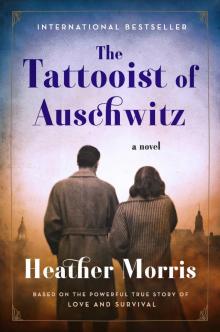 The Tattooist of Auschwitz
The Tattooist of Auschwitz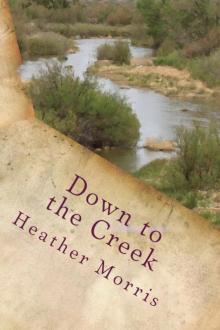 Down to the Creek- Book 1 of the Colvin Series
Down to the Creek- Book 1 of the Colvin Series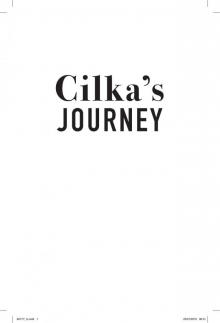 Cilka's Journey (ARC)
Cilka's Journey (ARC)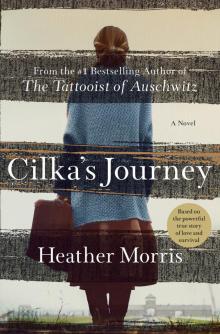 Cilka's Journey
Cilka's Journey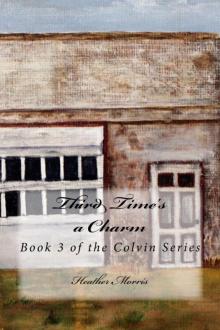 Third Time's a Charm- Book 3 of the Colvin Series
Third Time's a Charm- Book 3 of the Colvin Series